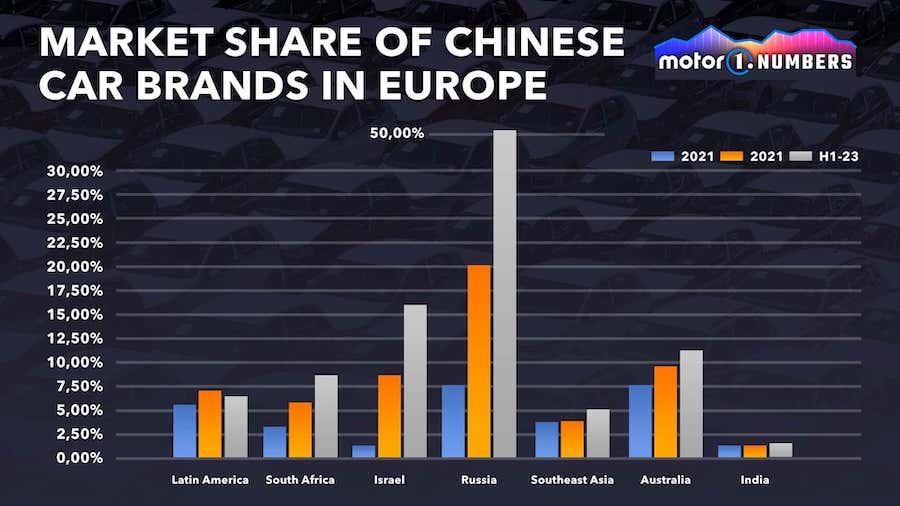We've all heard about the big plans of Chinese automakers. As with Western car manufacturers and their electrification goals in the coming years, Chinese manufacturers are also racing to expand their activities well beyond the confines of the national market. Some progress has been made with interesting results in specific regions, but a negative reputation persists among consumers abroad.
The expansion plan behind companies such as SAIC, BYD, Geely, GAC, Chery, JAC, Dongfeng, Changan, and Great Wall has two directions. These brands want to reach both developed and developing economies with a range of products capable of satisfying the different types of customers in those markets.
Progress On A Global Scale
Last year, Chinese automotive manufacturers achieved double-digit market share in regions such as the Middle East and Eurasia and 10 percent in Africa. In Latin America, however, the market share increased by two percentage points compared to 2021. The market share of Chinese automotive brands in poor and developing economies went from 4.79 percent in 2021 to 6.46 percent in 2022. In contrast, European brands lost 2.7 points of share and Koreans one point.
Further progress was made in the first half of this year. In South Africa, for example, market share increased from 6.08 percent in 2022 to 8.83 percent in H1 2023 for passenger cars. In Israel, the percentage jumped from 8.51 percent to 16.26 percent over the same period.
Russia and its isolation from the West due to sanctions have become the big prize for Chinese cars. Their market share more than doubled, going from 20.17 percent in 2022 to 50.20 percent in the first half of 2023. Something similar also happened in neighboring Kazakhstan.
The Chinese are also accelerating their penetration into Southeast Asia. In countries like Thailand, Chinese brands are rising from 9.39 percent in 2022 to 15.34 percent in the first half of 2023. Further south, in the developed markets of Australia and New Zealand, MG and other players are shaking up their sales.
The Situation In Europe
Europe is one of the long-term dreams of Chinese automakers. It is one of the most important markets in the world and a must-see for any brand that wants to go global. Some brands have been selling their cars for a few years already, but many more will arrive in the region in the coming months.
According to data from JATO Dynamics and other domestic sources, the share of Chinese brands in passenger car sales increased from 0.67 percent in 2021 to 1.57 percent in 2022, up to 2.37 percent in the first half of 2023 .
In countries like the UK, where MG is quickly climbing the ranks, market penetration of Chinese brands totaled 4.26 percent in the first half of this year. In Italy it's 4.12 percent, and 3.45 percent in Spain.
Despite the progress, there is still a reputation issue to resolve. Due to copyright problems, a history of low quality standards, and growing political tensions with Western societies, Chinese cars do not enjoy much praise abroad.
Many people are still reluctant to try them due to a negative perception also fueled by politics and economics. My interaction with the over 140,000 followers of my Instagram channel proves it: Chinese cars receive 62 percent negative reviews in surveys, compared to 40 percent for cars from Western brands. Investments to change the perception can certainly help, but it will also simply take time.



Related News



